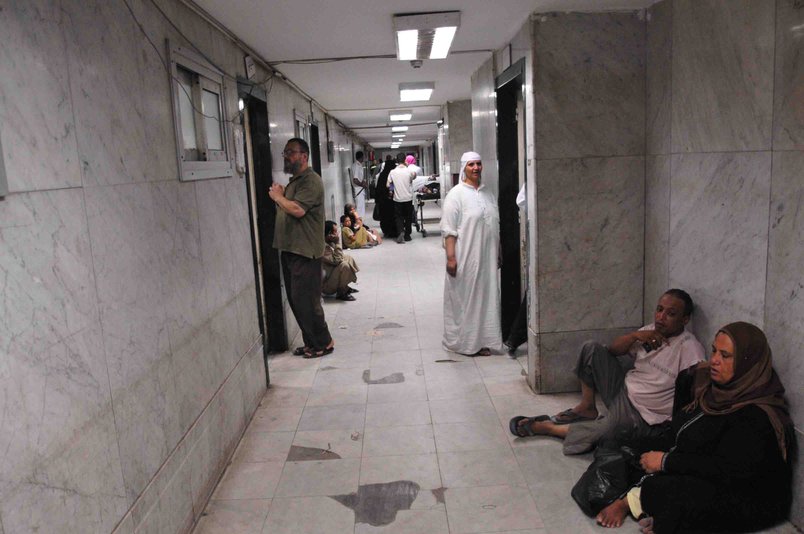Following former prime minister Ibrahim Mehleb’a unannounced inspection visit to the National Cardiac Centre early June, he said: “I am surprised.” In response, a group of doctors created a Facebook page that unearths images for rundown public healthcare facilities around Egypt through crowd-sourcing.
This initiative is called “So that you’re not surprised if you visit”, implying that it functions as a heads-up for official visits, and taking a sarcastic twist on Mehleb’s statement.
The Facebook page published images of snakes, cats, rats, and other animals roaming inside clinics and on patients’ beds. The pictures also showed patients lying on the floors awaiting treatment, damaged tools and infrastructure, and low-quality dorms used by doctors and nurses. It drew 100,000 likes within just a few hours of launching.
Only 33 beds are available for every 10,000 citizens in Cairo’s hospitals, according to the Egyptian Centre for Economic and Social Rights (ECESR).
The ECESR report mentioned that the amount of governmental expenditures on healthcare in Egypt is 5.4%, far less than other countries in Africa, such as Djibouti, which has healthcare expenditures of up to 14%.
Earlier this week, the page published a staggering image of a baby covered in dirt and they mentioned the baby was found in the garbage bin near one of the hospitals. They called on the ministry and hospital to start an official investigation into the incident. The hospital manager said Tuesday that he will launch an official investigation for the image.
In an exclusive interview with Daily News Egypt, the administrator of the page spoke about the group’s work, requesting to remain anonymous.
How did you come up with the initiative?
Launching the page came right after Mehleb’s visit to the National Cardiac Centre, where he put all responsibility on the doctors alone, without acknowledging the lack of funds. We were saddened that he did not ask any of the doctors about the problems they face, which are caused by the shortage of resources.
Were you not afraid of security interrogation?
Yes, we definitely were and many people actually warned us, but the public hospitals’ conditions have reached an unprecedented level of deterioration, which urged us to start this page to be a public pressure tool on the government, to give more attention to healthcare.
How do you review the mainstream media coverage of the health sector?
We personally preferred to stay away from media coverage, even for the page’s work. We refused to appear on any TV show and declined 18 interview requests on TV alone. The media turned a blind eye to the initiative and focused on the doctors’ shortcomings.
We decided to be the alternative media and people welcomed the idea and contributed massively, whether with pictures or reports. In the first 24 hours of launching the page, we received at least 1,500 pictures.
How do you verify the validity of pictures you receive?
As doctors, we are aware that the reality is much more blatant than all the pictures we receive but we cannot publish everything since some of them are too graphic. However, we sometimes might ask the sender to add pictures that show the name of the facility.
We publish images related to anything in the health sector, be it hygiene, medical equipment, medicines, or the presence of animals.
Why do you think this is important?
The recent renovations in many healthcare facilities were largely triggered by public pressure and our initiative. This proves that public pressure generally has a clear and positive impact despite what we face from crises in the sector.
What do you think is special about your initiative?
The fact that it is the only one that focuses on the health sector, unlike other initiatives that appeared later on in education and transportation, which already have many others addressing them. I believe this confused the audience.
What is the most common complaint you receive?
Most of the pictures are of lack of hygiene and photos of animals inside patients’ rooms. We also receive complaints mostly of the Ministry of Health’s emergency line, 137, baby incubators, and the burn sectors.
Where do you see Egypt’s ranking of healthcare in the next few years?
We believe Egypt has the best doctors worldwide, but unfortunately we lack adequate resources, proper management, and support for the medical teams. We also most importantly lack conscience.
